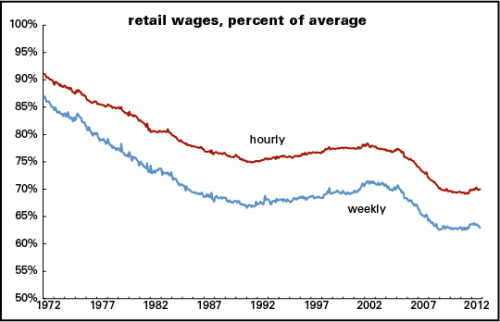Ezra Klein thinks constructively about Walmart
Neoliberal über-dweeb Ezra Klein just unleashed one of those “balanced” efforts on the controversies of the day that are so characteristic of his species: “Has Wal-Mart been good or bad?” The conclusion, it might not surprise you to learn: it’s “a complicated question to frame and a devilishly tough one to answer.”
Drawing on—I’m not kidding—Reason editor “Peter Suderman’s 17-part Twitter defense of Wal-Mart,” Klein asserts that Walmart’s low prices are a gift to low-income consumers. (They’ve dropped the hyphen/star, folks; here’s the official timeline.) The Bentonville behemoth’s wages may be low, but not “when compared with the prevailing wages in the retail sector.” Walmart’s influence in setting wages is not a topic that they consider. Nor does either our neoliberal or our libertarian actually look at the history of retail wages, because it would be rather inconvenient for their argument.
Over the last 40 years, as the real value of the hourly wage has fallen—down 9.3% since the January 1973 peak—the real retail wage has fallen three times as hard, 28.7%. The decline in weekly wages is even harsher, as workweeks have gotten shorter: down 17.2% in inflation-adjusted terms for all workers, but 38.3%, more than twice as much, for retail workers.
Or, looked at another way, the average retail hourly wage was 91% of that for all workers in 1972 (when the BLS’s retail wage stats begin) to 70% in October 2012. The decline in the weekly ratio was even steeper—from 87% of the average in 1972 to 63% in October. Here’s a graph of that history.
So clearly there‘s been a massive squeeze not only on the hourly wage, but also the number of weekly hours, in retail. (The average workweek is down about 3 hours since 1972 overall—but about 5 in retail.) And who has been the dominant force in retail over these decades? Walmart, of course. Not only is it famous for everyday low wages—it’s also famous for never providing its workers with as many hours as they’d like to work in a week.
And, yeah, it’s nice that Walmart has been able to provide a working class facing at best stagnant wages with lots of cheap stuff, but Walmart has itself had no small effect on dragging average wages down. It’s not just that they’ve been an inspiring business model for the rest for corporate sector, impressed by the chain’s growth and profitability. That’s led to endless rounds of outsourcing and speedup. But also by lowering the cost of reproduction of the working class, to use the old language, they’ve made it easier for employers to keep a lid on wages. You might think of the minimum feasible wage as the one that would assure that most of the workforce could show up and labor day after day. By lowering the cost of the bare minimum, Walmart makes it a lot easier for all employers to pay less. That brings a smile to the faces of stockholders, of course, but no so much the average worker.
Back in 1985, Alex Cockburn, reflecting on a creepy editorial about what Augusto Pinochet’s proper approach to fighting “terrorism” a decade into his dictatorial term should be, remarked that it was an instance of “our old friend The Washington Post editorialist trying to think constructively again.” Clearly Ezra Klein is extending a noble tradition, even though the Post is a mere shadow of its once-grand self.


Doug Henwood's Blog
- Doug Henwood's profile
- 30 followers




